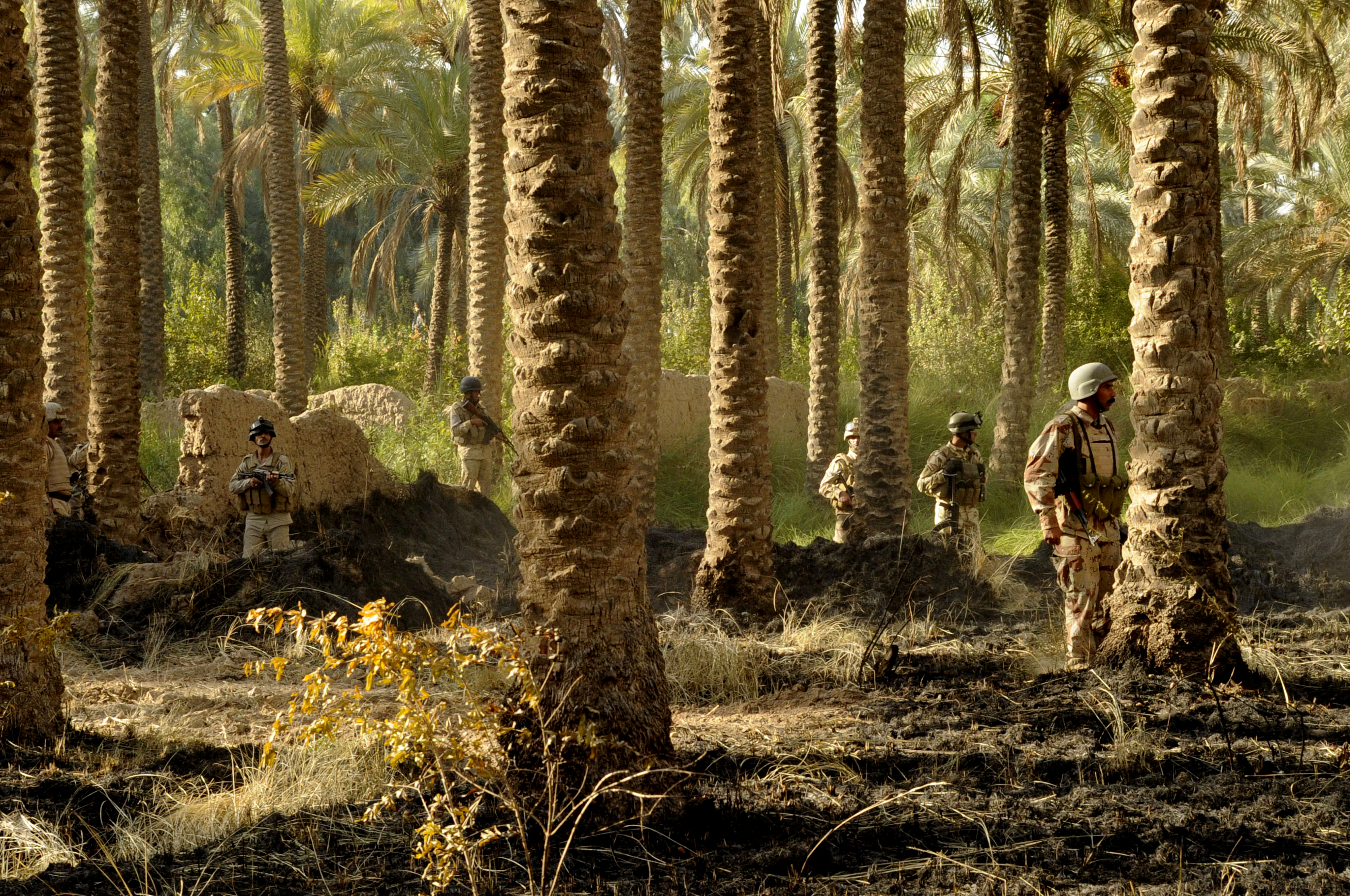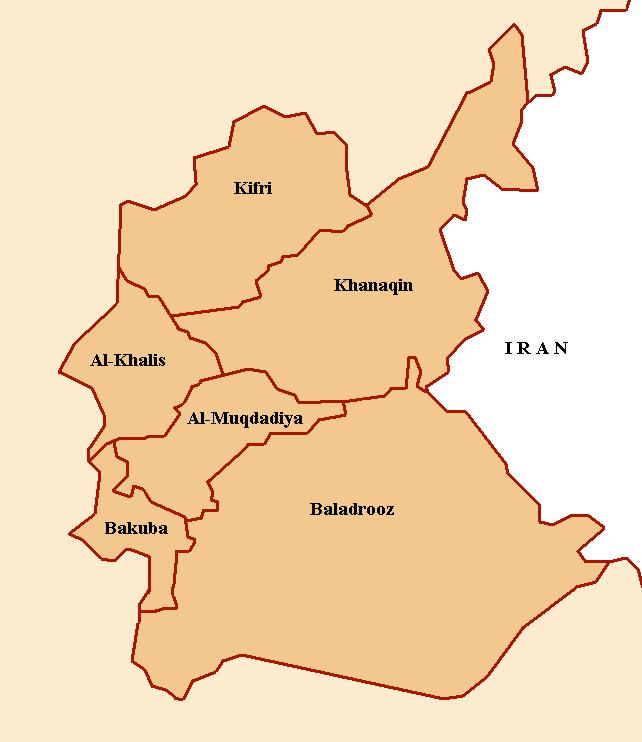Diyala Governorate on:
[Wikipedia]
[Google]
[Amazon]
Diyala Governorate ( ar, محافظة ديالى ) or Diyala Province is a Governorates of Iraq, governorate in central-eastern Iraq.
 Diyala Governorate extends to the northeast of Baghdad as far as the Iran–Iraq border, Iranian border. Its Capital (political), capital is Baqubah. It covers an area of 17,685 square kilometres (6,828 sq mi).
A large portion of the province is drained by the Diyala River, a major tributary of the Tigris. Because of its proximity to two major sources of water, Diyala's main industry is agriculture, primarily Phoenix dactylifera, dates grown in large groves. The province also contains one of the largest olive groves in the Middle East. It is also recognized as the Orange (fruit), orange capital of the Middle East. The Hamrin Mountains pass through the governorate.
Diyala Governorate extends to the northeast of Baghdad as far as the Iran–Iraq border, Iranian border. Its Capital (political), capital is Baqubah. It covers an area of 17,685 square kilometres (6,828 sq mi).
A large portion of the province is drained by the Diyala River, a major tributary of the Tigris. Because of its proximity to two major sources of water, Diyala's main industry is agriculture, primarily Phoenix dactylifera, dates grown in large groves. The province also contains one of the largest olive groves in the Middle East. It is also recognized as the Orange (fruit), orange capital of the Middle East. The Hamrin Mountains pass through the governorate.

 Diyala Governorate comprises six districts, listed below with their areas and populations as estimated in 2003:
Diyala Governorate comprises six districts, listed below with their areas and populations as estimated in 2003:
Provincial government
*Governor: Muthana al-Timimi *Deputy Governor: Mohammed Jassim al-JubouriCouncil
Geography
 Diyala Governorate extends to the northeast of Baghdad as far as the Iran–Iraq border, Iranian border. Its Capital (political), capital is Baqubah. It covers an area of 17,685 square kilometres (6,828 sq mi).
A large portion of the province is drained by the Diyala River, a major tributary of the Tigris. Because of its proximity to two major sources of water, Diyala's main industry is agriculture, primarily Phoenix dactylifera, dates grown in large groves. The province also contains one of the largest olive groves in the Middle East. It is also recognized as the Orange (fruit), orange capital of the Middle East. The Hamrin Mountains pass through the governorate.
Diyala Governorate extends to the northeast of Baghdad as far as the Iran–Iraq border, Iranian border. Its Capital (political), capital is Baqubah. It covers an area of 17,685 square kilometres (6,828 sq mi).
A large portion of the province is drained by the Diyala River, a major tributary of the Tigris. Because of its proximity to two major sources of water, Diyala's main industry is agriculture, primarily Phoenix dactylifera, dates grown in large groves. The province also contains one of the largest olive groves in the Middle East. It is also recognized as the Orange (fruit), orange capital of the Middle East. The Hamrin Mountains pass through the governorate.
Population
The city is home to a diverse population of Arabs, Kurds and Iraqi Turkmen, Turkmens. According to the latest statistics, the number of inhabitants is approximately 1,6 million.
Administrative districts
Cities, towns, and villages
* Baqubah (provincial capital) *Nahrawan * Muqdadiyah * Hebheb City, Hebheb * Khanaqin * Balad Ruz * Al Khalis * Khan Bani Saad City, Bani sa'ad * Jalawla (or Jalula) * Al-Sadiyah * Camp Ashraf * Dwelah * Kingirban * Marfu Village * Village of Nye * Udame * El Mansouria, Iraq, Al Mansouryah * Kan’aan * Al Wajehiya * Al Muntheriya * Abu Saydah * Buhriz * Mandali, Iraq, Mandali * Qaryat Imam ʽAskar * Kifri * Qara TapaInfrastructure
The Diyala Province boasts the Diyala Media Center which has one of the Middle East's tallest radio and television antennas at 349 metres (1,047 ft). The Diyala Media Center was built under contract by a Japanese architectural firm in 1989. It is one of Iraq's few independent radio and television stations that offer local television and radio news coverage as well as rebroadcasting state-run television.Civil unrest/Iraq war
There is evidence that Al-Qaeda in Iraq moved its base of operations from Al Anbar Governorate, Anbar province to Diyala in 2006 and during late 2006, Baqubah and much of the Diyala province were reported to have come under Sunni insurgent control. This insurgent control is reported to have continued through 2007 and into early 2008. On May 11, 2007, Army Maj. Gen. Benjamin Mixon, commander of the Iraq War order of battle#Multinational Force Iraq: complete current order of battle, Multination Division North said he needed more troops in order to contain the current level of violence in the Diyala province, this coming in the recent wake of a Iraq War troop surge of 2007, troop "surge", Individual Ready Reserve#Activations in the Global War on Terror, involuntary recalls by the U.S. military, and the Iraq Study Group, public debate about the Multinational Force Iraq#Multi National Force Iraq, level of commitment from the U.S. government. By mid-2007 the Islamic State of Iraq, already holding Baqubah and most of the province under its control, declared its capital to be Baqubah. In June 2007, US forces launched Arrowhead ripper, Operation Arrowhead Ripper with night air assaults in Baqubah. By August 19, Baqubah was largely secured, although some insurgent presence remained in the city and surrounding areas. Fighting continued in the Diyala River valley but by the beginning of October, US and Iraqi forces held most of the province while the insurgents were in retreat to the north and west. On October 27 the Islamic State of Iraq attacked a police base in Baqubah, killing 28 Iraqi policemen and police recruits, showing that insurgent cells still remain in the province. In January 2008 Operation Phantom Phoenix was launched in an attempt to eradicate the remaining insurgents following the Diyala campaign between 2006 and 2007. Mid-2008 saw many changes in Diyala province with an increased effort by U.S. Forces and a substantial Iraqi Army presence, and in the Baqubah region, Islamic State of Iraq's activity was dramatically hampered, and the Sons of Iraq program served only to further weaken Islamic State in Iraq.Declaration of autonomy
In December 2011, the governing council in Diyala province declared itself a semi-autonomous region within Iraq. This comes two months after Saladin Governorate made a similar declaration. The council in Diyala, using Constitution of Iraq#Regions, Article 119 of the Iraqi Constitution as justification, made the declaration because of suspicion of the Shi'a-dominated government of Prime Minister of Iraq, Prime Minister Nouri al-Maliki. Unlike Salahuddin province however, Diyala province is more ethnically and religiously mixed, and such an announcement led to the outbreak of protests in the province.See also
*Hisham al-Hayali, former governor *Battle of Baqubah *2004 Baqubah bombing *15 July 2008 Baquba bombings *15 September 2008 Balad Ruz bombing *23 April 2009 Iraqi suicide attacks *3 March 2010 Baqubah bombings *2014 Musab bin Omair mosque massacreReferences
{{Authority control Diyala Governorate, Governorates of Iraq Upper Mesopotamia